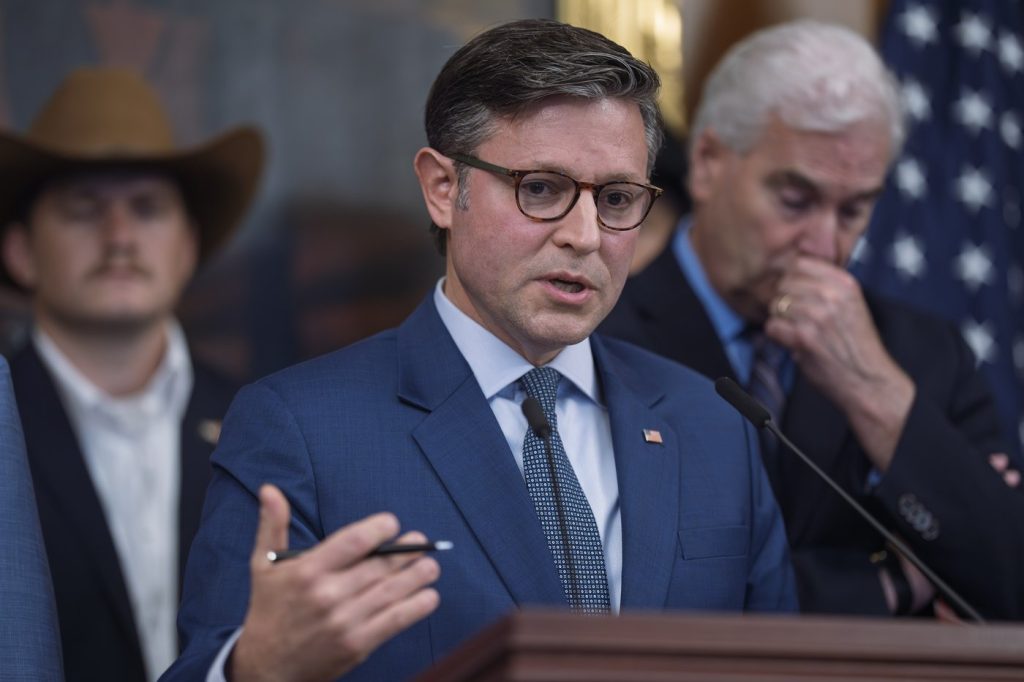WASHINGTON (AP) - As the House of Representatives prepares to vote on a bill aimed at preventing a partial government shutdown in under two weeks, both Republican and Democratic lawmakers are showing no signs of compromise. The proposed bill seeks to maintain current funding levels through November 21. However, Democratic leaders are staunchly opposed and have threatened a government shutdown unless they are given a voice in the negotiations. Securing some Democratic support will be crucial for the bill to reach the President's desk for approval.
House Speaker Mike Johnson is facing a tight vote count as he attempts to rally Republicans to support the funding patch. Many within his party have traditionally resisted such temporary measures in past budget disputes. Nevertheless, Republicans now have a chance to shift public perception, positioning Democrats as responsible for any resulting shutdown if Congress fails to act by October 1. On the eve of the vote, former President Donald Trump urged House Republicans to come together and pass the bill, emphasizing that opposition from Democrats would lay the burden on them. Trump's endorsement often plays a vital role in convincing reluctant lawmakers within his party.
Johnson expressed confidence in securing the necessary votes, stating, "We’re going to get this government funded." However, across the Capitol, Senate Democrats are hopeful that public sentiment will favor their financial proposal, which seeks to address impending increases in health insurance premiums for millions of Americans purchasing coverage through the Affordable Care Act's marketplaces. They have introduced their funding plan, which includes extending enhanced health insurance subsidies expiring at the year's end and reversing Medicaid cuts enacted under a previous Republican bill.
Senate Democratic Leader Chuck Schumer believes that a clear distinction between Democratic and Republican actions will resonate with the American people. He has consistently warned of the consequences of a government shutdown if health care issues are not addressed. Senate Majority Leader John Thune, a Republican from South Dakota, noted that the Senate would consider both the House bill and the conflicting Democratic proposal if the former passes but neither is expected to gather the 60 votes required for approval.
Senators may hold off on further action until September 29, just a day before the shutdown deadline, as the Senate is scheduled to recess next week for Rosh Hashana, the Jewish New Year. Both factions of Congressional Democrats are closely monitoring Schumer's decisions, especially in light of his controversial agreement with Republicans in March to extend government funding. At that time, Schumer faced backlash from his party's left wing after arguing that a shutdown would yield unfavorable conditions that could allow for further cuts from the Trump administration. This earlier decision led to temporary discord with House Democratic Leader Hakeem Jeffries, who maintained his opposition to the GOP funding measure.
Now, Schumer and Jeffries have reportedly found common ground, with Schumer asserting that public opinion has shifted since March, becoming more skeptical of Trump and Republicans following Medicaid cutbacks. Most Democrats are unifying behind Schumer's insistence on negotiations regarding the bill and backing his threats of a government shutdown, although a plausible strategy for avoiding such a scenario remains uncertain.
Republicans are leveraging this situation to frame any failure to pass the bill as a consequence of Democratic unwillingness to negotiate. "Democrats would love nothing more to put a shutdown in our lap. It’s not going to happen. If it does, it’s on them," stated Rep. Ralph Norman of South Carolina, a member of the House Freedom Caucus known for opposing temporary funding measures. Senator John Barrasso, the Senate's second-ranking Republican, echoed this sentiment, reminding that Schumer previously indicated that passing a clean continuing resolution could prevent an unnecessary government shutdown, suggesting that his current stance contradicts that assertion.










